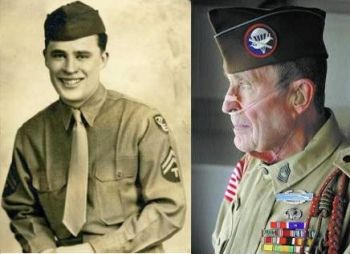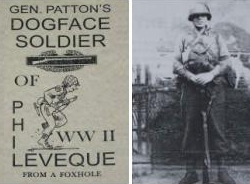
Publisher:
Bonnie King
CONTACT:
Newsroom@Salem-news.com
Advertising:
Adsales@Salem-news.com

~Truth~
~Justice~
~Peace~
TJP
Jun-17-2010 18:46

 TweetFollow @OregonNews
TweetFollow @OregonNews
PTSD & Alcoholism in a Real American WWII War Hero
Arthur 'Dutch' Schultz, 82nd Airborne 505 PIR
Carol Schultz-Vento for Salem-News.com
The life challenges of a soldier.
 Arthur 'Dutch' Schultz |
(PHILADELPHIA) - "HUT - TWO - three - four. Hut - two - three - four." The cadence of my childhood.
Echoing footsteps on the wooden floors. Memories of a spindly, pale child with purplish under-eye circles marching behind her athletic, paratrooper dad. Up and down the narrow Philadelphia rowhouse steps, past the shoebox-sized bedrooms, the stark no-sink bathroom, and the musty coal bin, the 6-year-old girl's mission was to not give up - just like Dad.
In 1952, my father, Arthur "Dutch" Schultz, was in his late twenties and had the physique of the welterweight boxer and baseball player he once was. Tall, with mercurial blue-green eyes and light brown hair, Dad had a rakish smile that charmed every woman he met.
I didn't know at the time, but he had been the boxing champion of his 82nd Airborne regiment, and a combat survivor of the European Campaign in World War II, including a bloody and confused D-Day and nightmarish Battle of the Bulge. To me, he was just Daddy - and my hero.
In appearance we were a study in contrasts - the All-American young man with his little Italian waif of a daughter. I inherited my mother's Mediterranean looks, but in temperament and interests, I was just like Dad. Our marching game was all I knew of my father's war during my early years. Because Dad was silent about his war experiences, only later did I realize that his war wasn't all fun and games. The traumas that he experienced during his war years would haunt him for decades.
During his life, he fought two wars. When the young paratrooper descended from a flak-ridden plane into the dark Normandy sky on June 6, 1944, little did he realize that his survival of D-Day was only the beginning. Battling Hitler and the German Army would be finite. Not so the struggle for his psyche.
The World War II exploits of Dutch Schultz have been documented. Dad's stories have struck a responsive chord - he has been cast as "everyman" and symbolic of the citizen soldier.
Cornelius Ryan's 1959 book, "The Longest Day," depicted Dad as an eager and sometimes-lost paratrooper dropped behind enemy lines on D-Day and Richard Beymer, portrayed dad in the movie version as hyperactive and confused.
Ryan further followed Dad's march through Europe by including him in the 1966 chronicle of the final days in Germany, "The Last Battle," and the saga of Market Garden in the 1974 book, "A Bridge Too Far."
Decades passed with little recognition for the veterans of "The Good War." However, as they aged, nostalgia took hold, spurring increased interest in World War II victories. Noted historian Stephen Ambrose's book, "D-Day - June 6. 1944: The Climactic Battle of World War II" was published on the 50th anniversary of the attack. Dad’s war exploits once again gained attention. Television, with its visual impact, presented an ailing Dutch Schultz as one of a select group of World War II veterans featured in documentaries on D-Day anniversaries. The old paratrooper with the craggy, lined face, expressive body language, and oxygen tubing in his nose was still a compelling symbol. All the glory focused on Dutch Schultz and his fellow World War II veterans in their waning years can be counterpoised to the invisibility of the combat vet in immediate postwar America.
Only about 25 percent of the Army was assigned to ground combat divisions. In those divisions, only about half the soldiers actually were in battle and exposed to life-threatening situations. Many in World War II had not felt the fear and terror of loss of their lives, had not seen or caused death and destruction, had not lived exposed to the extremes of weather, constant enemy shelling and seeing the torn and bloody bodies of their buddies like my paratrooper dad did.
He was recognized as a hero but he never identified as one. He tried hard to let go of the traumas but continued to fight a war within himself for years. He left the killing fields of Europe, but Normandy, Holland and the Ardennes never completely left him.
When I was a little girl, Dad hid the memories except in the still of the night. He would relive the horror of the war in his nightmares. Bolting from a sweat- soaked bed, he would start to fire his imaginary machine gun, while alerting his buddies of the enemy presence.
The daytime repressing of his war trauma took its toll in my father's alcoholism and my parents' marriage, and when I was 12, dad and mom divorced. After the divorce, dad hit bottom – a victim of his alcoholism. He had lost his family; subsequently he lost his career. His attempts to obtain assistance from the Veteran’s Administration in the sixties and seventies were frustrating. Classified as having anxiety neurosis, character disorder and an inability to “digest his war experiences”, he struggled to combat his alcoholism and unrecognized PTSD on his own, by attending AA meetings nightly.
For four decades, dad was a “recovering alcoholic” who forged a new career path, directing drug and alcohol programs in an attempt to assist others in overcoming their demons. Dad’s post traumatic stress was a constant companion for the remainder of his life, but he tried to walk along the path with others who needed his guidance.
PTSD & ALCOHOLISM ARE REAL !!
Special thanks to Dr. Phil Leveque for working with Carol Schultz-Vento and helping bring this story together, it is an honor to talk about such heroes on our pages. Learn more about Dr. Leveque below:
 Got a question or comment for Dr. Leveque?
Got a question or comment for Dr. Leveque?
Email him: Newsroom@Salem-News.com
 More information on the history of Leveque can be found in his book, General Patton's Dogface Soldier of Phil Leveque about his experiences in WWII.
More information on the history of Leveque can be found in his book, General Patton's Dogface Soldier of Phil Leveque about his experiences in WWII.
Order the book by mail by following this link: Dogface Soldier.
If you are a World War II history buff, you don't want to miss it.
Watch for more streaming video question and answer segments about medical marijuana with Bonnie King Dr. Phil Leveque.
Click on this link for other articles and video segments about PTSD and medical marijuana on Salem-News.com: Dr. Leveque INTERVIEWS & ARTICLES
Articles for June 16, 2010 | Articles for June 17, 2010 | Articles for June 18, 2010
Salem-News.com:
googlec507860f6901db00.html



Quick Links
DINING
Willamette UniversityGoudy Commons Cafe
Dine on the Queen
Willamette Queen Sternwheeler
MUST SEE SALEM
Oregon Capitol ToursCapitol History Gateway
Willamette River Ride
Willamette Queen Sternwheeler
Historic Home Tours:
Deepwood Museum
The Bush House
Gaiety Hollow Garden
AUCTIONS - APPRAISALS
Auction Masters & AppraisalsCONSTRUCTION SERVICES
Roofing and ContractingSheridan, Ore.
ONLINE SHOPPING
Special Occasion DressesAdvertise with Salem-News
Contact:AdSales@Salem-News.com
Terms of Service | Privacy Policy
All comments and messages are approved by people and self promotional links or unacceptable comments are denied.
Kelly wisener November 27, 2019 6:16 pm (Pacific time)
One of my fondest memories was the OPD (officers professional development meeting) where I met your father at his home in Silver Lakes CA. That was around 1997. I will never forget his stories and the impact he has had on my life.
[Return to Top]©2026 Salem-News.com. All opinions expressed in this article are those of the author and do not necessarily reflect those of Salem-News.com.